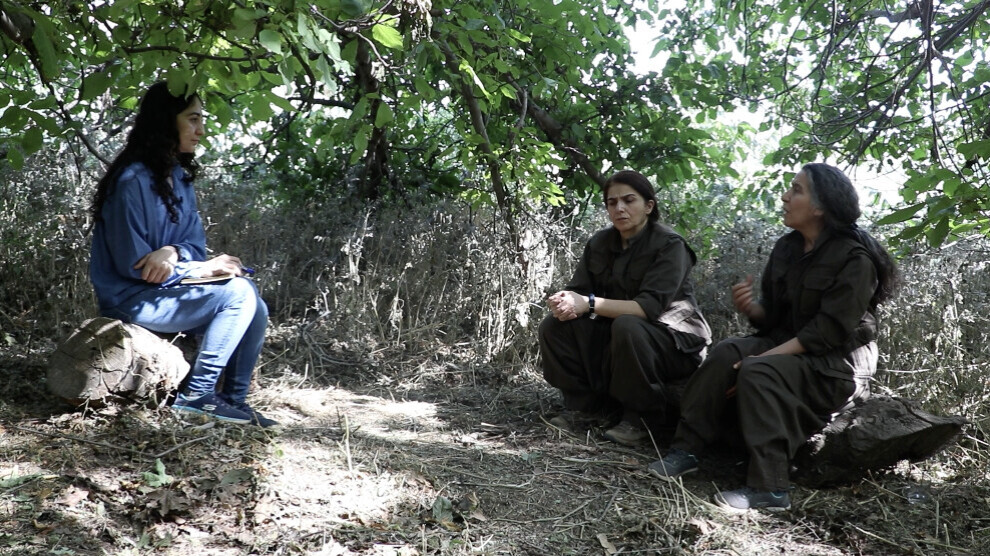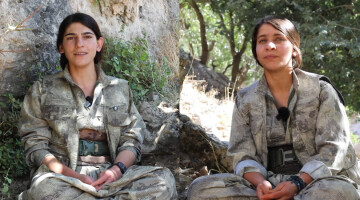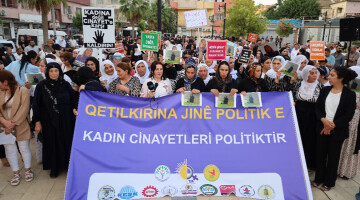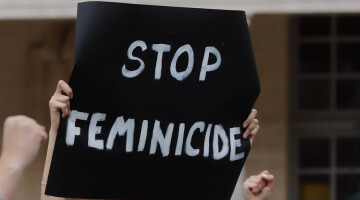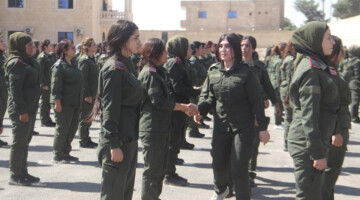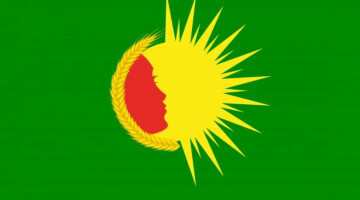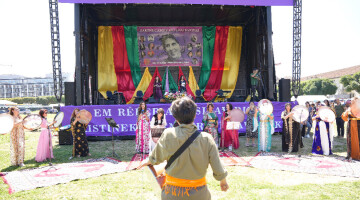Ayten Dersim, a member of the Kurdistan Free Women's Party (PAJK) Coordination, spoke about the martyrs of June by focusing on the pioneering women who carried out self-sacrificing actions. She explained that through the legacy of these martyrs, they constantly question themselves in terms of patriotism, freedom, ethics, and aesthetics, within the framework of the women's liberation ideology and that they wage a struggle for existence based on their own inner strength and autonomy.
Çiğdem Doğu, a member of the Executive Council of the Kurdistan Women’s Communities (KJK), shared her reflections on communal life and stated: “What matters is that we, as a society, are in a position to govern ourselves. It is not about becoming a state and then ruling society as that state. The Kurdish people will govern themselves. The Kurdish people, together with the Assyrian and Turkmen peoples, will govern themselves. Women will govern themselves with their own distinct and autonomous will. And of course, men in society will assert their existence by living and struggling alongside others. This is a communal way of life. We are talking about a life this simple. It is not something distant from us.”
Ayten Dersim, a member of the Coordination of the PAJK, and Çiğdem Doğu, a member of the Executive Council of the KJK, shared their reflections on the martyrs of June and the struggle for socialism in an interview with Medya Haber TV.
Here is the first part of this conversation, with a reflexio by Ayten Dersim.
AYTEN DERSIM: In the name of comrade Zîlan, I remember with respect and gratitude the comrades Sema, Gulan, Helmet, Raperîn, Bêrîvan, and the many other martyrs of freedom whose names I cannot list here. On this occasion, I once again renew our promise, as their comrades, to carry forward the struggle for freedom they waged and the free life they entrusted to us.
As the Free Women’s Movement, we are also a movement of martyrs. From the very first step we took on the path of freedom, both as Kurdish people and as women, we were fully aware that we had embarked on a difficult and determined struggle. We also knew that walking this path meant we would win only through struggle and that we would pay a price.
We have always embraced the meaning that President Öcalan has attributed to martyrs. What did each martyr leave to the movement, to the people, and to women? They fought with their ideology and philosophy for a free land, a free society, and for the free existence of women within society. In this sense, when we commemorate martyrs, we always try to walk with full awareness of their goals, of what they left unfinished and entrusted to us and with a clear understanding of how to honor them, how to succeed, how to win. The current level of our struggle is tied directly to them. As their comrades, we have tried to be the ones who carry this fight forward. Comrade Zîlan’s martyrdom, her decision to carry out a self-sacrificing action, shows what it means to be a people, what it means to fight for existence, and what it means, especially for a woman, to be free. Her path was one of complete commitment to a purpose. It was a march toward that goal, a total focus on the objective. It was a journey that had to be taken, no matter the cost.
We must embody Zîlan’s goddess stance
Comrade Zîlan’s self-sacrificing action, her physical act of martyrdom was, of course, a form of resistance. But it was not only that. She waged a struggle for a philosophy of freedom. The conditions of that time, both politically and in the context of the historical moment, meant confronting an international conspiracy against President Öcalan, the continued denial of the Kurdish people in our region and across the world, and the compounded difficulty of being a woman within that denied identity. All of this, in the person of Comrade Zîlan, was transformed into a thought, into a way of life, into a determined goal. This idea, this ideology, this philosophy took the form of action. And as she carried out that action, her stance was one of walking toward a goal, with full commitment to success. Within the women’s movement, we have always taken the month of June as a moment to reflect on the meaning of her stance.
We ask ourselves: “How do we become like Zîlan?” Because Zîlan, as President Öcalan defined her, was a goddess. And what is a goddess? She is the one who constantly creates, who renews, who gives birth, who grows and makes others grow. She is never fixed or static. She always becomes aware of freedom and continually reshapes herself toward it. As she reshapes herself, she reshapes society, especially women. This is how we have always understood her. That is why, as her comrades, we always say: every woman of Kurdistan and women around the world, should come to know her. They must carry forward her goddess stance, her goddess resistance, her goddess longing. To embody her means to live and realize that struggle in practice. That is why we, as a movement, fight in pursuit of becoming goddesses. History teaches us that the determination of goddesses was forged through immense struggle. Their path was never easy. And today, though the conditions have changed, the essence of that struggle continues. The dominant global system has not disappeared, and no equal society has yet been established. Freedom cannot be separated from socialism, nor from communal life. Comrade Zîlan embodied a stance grounded in deep philosophical consciousness.
Comrade Sema analyzed life in its entirety
Comrade Sema reached a deep awareness of womanhood following comrade Zîlan’s self-sacrificing action. Her field of resistance was prison. Our people know well what the prison space represents, especially for women. And if it is a prison in Turkey, then it is the place where the most violent, most crude, and most refined aspects of the male-dominated system are imposed. The aim of such a place is to break the will of revolutionary women and men alike, to subdue them, to force them into submission, to render them meaningless.
Comrade Sema was fully conscious of this. Comrade Zîlan’s guerrilla life had lasted only one year, yet she still embodied the culture of the goddess and showed us what it meant to become one. Sema’s struggle had deeper roots. She had guerrilla experience, and she had undergone the education of President Öcalan, equipping herself ideologically. These elements shaped a stronger and more profound consciousness. While this is not meant as a comparison, Sema was an ideologically rich personality. Prison was a space where the enemy applied every method of special warfare and psychological warfare to force surrender. It was also where the male-dominated mindset revealed itself most clearly, a system that does not recognize a woman as a subject of will, does not take her seriously, neither as a person nor as a woman, and refuses to acknowledge her as a political being. It is a place where decisions are made through the domination of one mentality over another.
Sema analyzed life as a whole, building on her own personality. We often say: what has five thousand years of male dominance created? The enslaved woman. The woman taken captive. The woman who no longer belongs to herself. Over five thousand years of history, this has been their goal. Comrade Sema challenged this from within herself. She asked: what does it mean to be a free woman? Where must that struggle begin? How should it unfold? She confronted and resolved the enslaved female personality at its highest point. Through deeply human reflection and analysis, she surpassed herself, dismantling the mental frameworks, relational patterns, and belief systems that shape the psyche of the enslaved woman. These are what strip a woman of her womanhood.
There are thousands of gendered forms imposed upon women. Sema analyzed them holistically. Through this analysis, she began to see how a woman must liberate herself, how she should live, and what her relationships should be like. Inside the prison system, the target was President Öcalan. Sema understood this clearly. The philosophy and ideology of President Öcalan had touched all women, and women had begun to rebuild themselves through it. A tremendous struggle was taking place for this in the mountains, in the prisons, in the plains, and in the cities. And there was an attack on this very struggle. She recognized that this attack had to be responded to ideologically, philosophically, and existentially. These were not abstract concepts. She made a crucial statement: “There are not two suns, there is one sun. That one sun is what illuminates all of humanity. Any second sun is merely a reflection, never the essence.”
That so-called second sun is a symbolic strike against the male-dominated system that seeks to reinvent itself, it is an attack against the reality of President Öcalan. And she responded, saying: “Then I will rebuild myself in such a way…” She proposed a mode of struggle in which women must both self-interrogate and define how to stand in the face of male domination. With the action she carried out, she created a line between March 8 and Newroz. In her letter, she wrote that she wanted to become “a bridge stretching from March 8 to March 21.” And she built that bridge.
This applies to all women. Yes, comrade Sema was from Kurdistan, a Kurdish woman, a woman of the Middle East. But we have gone beyond that. By becoming conscious of our identity and understanding what it means to exist, we have seen that this also moves toward universality. Comrade Sema succeeded in becoming an extraordinary light within those four dark walls of prison. There is no one who has not heard of her action, her resistance, or her struggle. And those who heard began to seek her out, to understand her. A questioning began: who was this woman? Where did she come from, that she could carry out such an action and be heard so widely? People began to move toward her. They wanted to know her. In this sense, comrade Sema became a pioneer who showed all of us how the ideology of women's liberation must be lived and how it must be socialized. She truly became a pioneer.
Through the example of comrade Sema, we have learned this: yes, they are products of a struggle, but they embodied that product in their personality and stance in a holistic way. Theory took on concrete form in them. Their ideas became reality.
Comrade Gulan was among the first commanders of autonomous women's organization
Comrade Gulan was one of the earliest women to take part in the militarization of our movement. She was active across many of our Northern Kurdistan (Bakur) provinces, where she struggled, led guerrilla warfare, and served as a commander. She was a tactical commander, someone who coordinated combat, trained herself and others, and took the lead in building autonomous women's structures in the mountains. She was one of the first commanders to do so.
Her personality as a female commander became even more defined through her guerrilla practice. Her consciousness was rooted in women’s guerrilla warfare, and her leadership was shaped accordingly. She demonstrated through her character, her stance, and her way of struggle what it means to command as a woman. What should female leadership look like? She embodied that question with clarity.
Following the imprisonment of President Öcalan, hundreds of women guerrillas made the decision to embrace the path of self-sacrifice. They chose to carry the freedom struggle forward by becoming self-sacrificing militants. Comrade Gulan was one of them. Her stance and participation were truly self-sacrificing. She had no hesitation, no doubt, no fear. She spoke what she believed with freedom, and when she spoke, she was both political and highly disciplined. Her words always carried deep ideological meaning. Comrade Gulan, this woman commander with such a powerful stance, was assassinated from within by internal forces in a conspiratorial manner. It was an attempt to strike at the women’s movement. Because comrade Gulan was a prominent figure in the guerrilla movement, a leader with a clearly defined position.
The aim of targeting such pioneers was to shake the women’s movement, to push it into confusion, to weaken its conviction, and to force it into surrender. It was an attempt to prevent the continuation of the struggle based on the ideology of women's liberation. At that time, there was an intense war of gender consciousness. Comrade Gulan played a very central role in that struggle. That is why she was targeted. All of this carries a profound meaning for us today. These pioneering women, these militant comrades, proved through their stance and their practice what freedom means and how one must struggle to achieve it.
The consciousness of womanhood was deeply present in Bêrîvan Zîlan and Leyla Agirî
Comrade Bêrîvan was also among the first women to take part in the early stages of militarization. For many years, she played a leading role in the struggle. Alongside comrades like Zîlan, she became a true pioneer across many fields of our movement. She was one of those who, without hesitation, rushed to the front lines in the most dangerous positions, putting herself forward with the spirit of self-sacrifice. Her clarity on how to build and embody freedom was unmistakable. The consciousness of womanhood was very much alive in comrade Bêrîvan as well. The same was true for comrade Leyla Agirî. She worked in many different fields, and in each area, she led with the stance and spirit of a fighting woman. Her awareness of being a woman and the methods and paths needed to fight for it, were always present in her.
Comrade Leyla was also one of the first women to take part in the work of Jineology. Her perspective was grounded in a jineological approach to life. She carried this struggle wherever she went, leading both the practical and academic aspects of it. At the same time, she fully understood the necessity of transforming men and consistently worked toward this goal, spreading this awareness in every sphere she entered. As much as she developed her own consciousness as a woman, she also worked to transform the male mindset. Because only by transforming men can we build a shared and free life. Comrade Leyla was one of the pioneers of the Free Women’s Movement.
All our male comrades should take comrade Helmet as an example
Comrade Helmet was one of our comrades from Southern Kurdistan (Başur), a militant and a pioneer. His stance and participation truly set an example for the entire movement and for what it means to take on leadership responsibilities. He had witnessed the presence of President Öcalan and received his education at a young age. He had a deep understanding of what it means to be a man in the guerrilla struggle. Helmet was truly modest, truly socialist and it is entirely appropriate to describe him that way. Through his stance, his relationships, his bond with women, and his connection with the wider community, he embodied the spirit of a democrat. You could feel it even without speaking to him. He made his presence known everywhere, not through force or pretense, but through the natural presence of a revolutionary, of a socialist, of a human being. On this occasion, I want to emphasize that all our male comrades should take such friends as role models and approach the responsibilities of comradeship with seriousness.
Our martyrs, through their self-sacrificing stance, gave this month of June its meaning. To understand this month, to truly grasp its spirit, to know how we must live it, we must continuously recreate ourselves in that spirit. It is not enough to simply remember. We must also fulfill our duties and responsibilities to the martyrs. Each of us must strive to reach them, to continue their mission. We must ask: how will I carry out their duties? How will I turn their dreams into practice? This is the duty of comradeship. Are we not all travelers on the same path? We are companions on the path to freedom. And that means we owe one another a debt, a responsibility.

